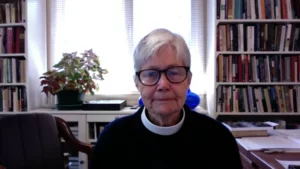Katherine Sonderegger confesses that Volume 2 of her Systematic Theology “is a strange book, a disorienting one, and, some would say, an impossible one” (p. xv). It is, after all, a book about the inner Life of God, as its title makes clear—The Doctrine of the Holy Trinity: Processions and Persons.
Theologians have been eagerly awaiting this volume’s arrival ever since the first was published in 2015, which made grand promises about Trinity and monotheism and the Scriptures of Israel. Here then, at last, is Sonderegger’s attempt “to fulfill these ambitious goals” as she sets forth this “unusual dogma of Trinity” (p. xi).It is a book full of resistance, surprise, and grace. Sonderegger’s negations—“Not all is revelation,” “Not all is Christology,” “Not all is soteriology”—come together to give space for her affirmation that “the dogma of the Holy Trinity unfolds, on bended knee, the permanent Mystery of the inner Life of God” (p. xx). She takes not Persons but Processions as the foundation of the doctrine of the Trinity, and insists that it is taught in the Old Testament itself. Exodus and Isaiah feature prominently, as does Leviticus, as its “account of sacrifice reinscribes the Processional Life of God” (p. 367). The Fire of Holiness burns through every page of this reverent, scriptural reflection on the inner Life of God.
The book is a wonder, unique in its form and content, already being received with much praise. Philip Ziegler has called it “a marvel,” and David Ford labeled it “imaginatively soaring and daringly original.” Many have commented on its reverence and piety, as Walter Moberly said it “stirs the spirit and touches the heart” and George Hunsinger remarked that the experience of reading the book is “like listening to someone pray.” Sarah Coakley summarizes the general sentiment of the book’s endorsers: “This is a bold and exhilarating text—poetic, profound, and richly demanding spiritually.”
Sonderegger’s work warrants serious and prayerful attention, not least because of the profound questions it raises about the mysterious Life of the Triune God. Are there two Processions, or one? Can we keep the goods of Nicene theology without its methods and modes of discourse? To what degree can we speak of God without speaking of Christ? How should we understand the role of Sonderegger’s own unique voice, reverent and inimitable as it is, as it relates to her doctrinal arguments and claims? Such questions are raised by the theologians featured in this symposium. It’s our joy to publish these reflections here, and also to host a panel discussion where the contributors will continue to think together about the inner Life of God.
####
It was our joy to host a panel discussion on this book, featuring the contributors to this symposium. You can find the video from that event on our resource page.








Comments
Be the first one to make a comment!